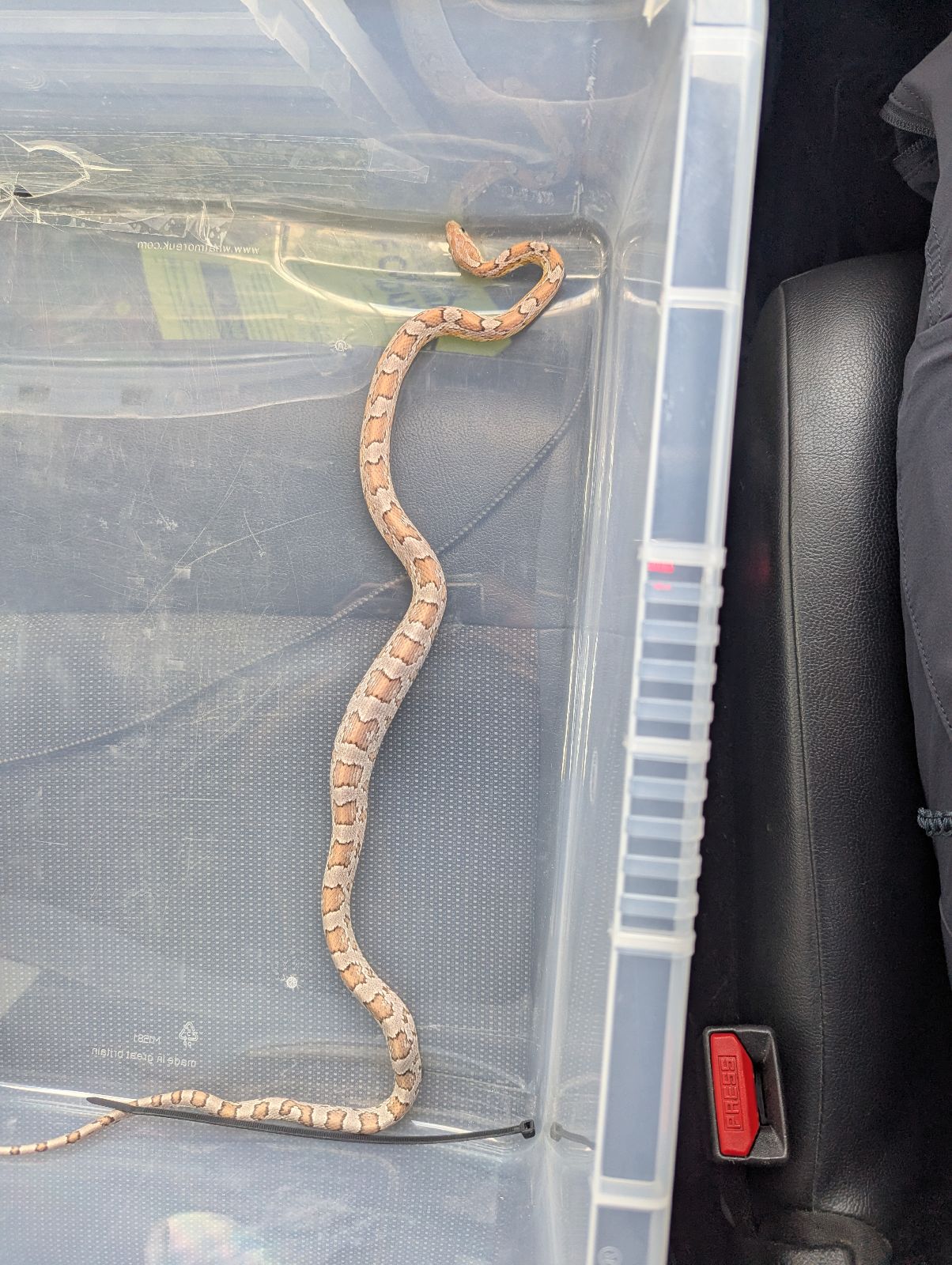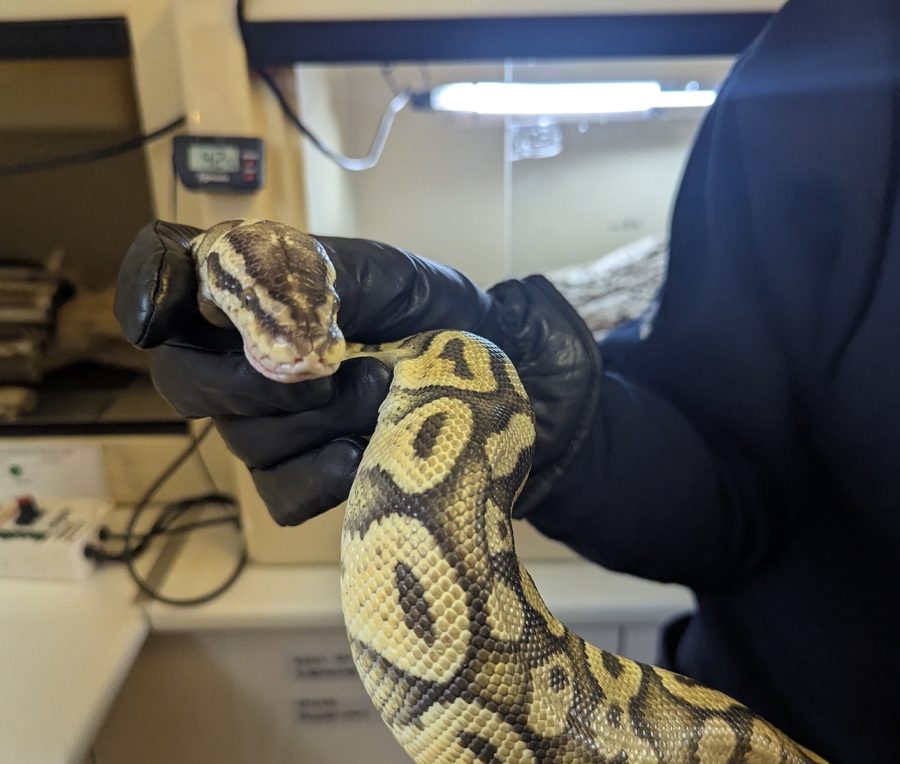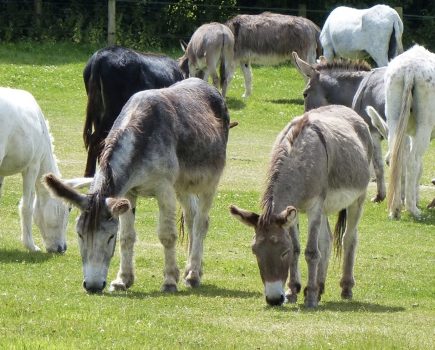The RSPCA is braced for an increase in reports about stray pet snakes – but owners can do their bit to help and avoid snake escapes.
The charity is also expecting other snake-related incidents to rise this summer and is advising pet snake owners to be extra-vigilant in the warmer months.
The warning comes after an RSPCA Animal Rescue Officer rescued a stray snake in a Greenwich, London fish and chip shop after receiving a report about a ‘python’ that was on the loose just last week (7 July).
New data – launched ahead of National Snake Day (16 July) reveals that snake incident reports peak in the warmer months of July, August and September. Last year, they totalled 383 during that period alone, an 18% rise compared to 2023 (323 incidents). In the face of this upward trend, the RSPCA fears totals for this summer could rise again.
In total, the RSPCA received 982 reports involving snakes in need of help last year – a six percent increase on 2023 numbers (928). At least 267 of 2024’s reports were about snakes that had been found loose or stray .
Essex (21), Norfolk (20), Greater Manchester (17) and West Yorkshire (17) generated the most snake related reports last year, followed by West Midlands (16) and Hampshire (14).
And as the heatwave continues, the charity is advising snake owners to be particularly careful and to double-check that the animals’ enclosures are securely fastened.
The RSPCA is also keen to help members of the public differentiate between native snakes – such as grass snakes or adders, and non-native pet snakes, which may have escaped from their owner or have been abandoned. Unless sick, injured or in danger, native snakes should be left undisturbed. If the snake appears to be a pet, people are urged to keep their distance and visit the RSPCA’s website for information on what to do.
RSPCA senior scientific officer Evie Button said: “Snakes are excellent escape artists and will take the opportunity of a gap in an enclosure door, or a loose-fitting lid to make a break for it.
“Last year, we took almost one thousand reports about snakes – more than in 2023 – with the highest number of calls coming in during the summer months. This is not surprising, as snakes become more active during hot weather – so as the UK continues to swelter this summer, we’re braced for another influx of calls.
 “The RSPCA urges all pet snake owners to be extra vigilant at this time of year, invest in an enclosure suitable for the particular species and make sure that enclosure is kept secure – and locked if necessary – when unattended.
“The RSPCA urges all pet snake owners to be extra vigilant at this time of year, invest in an enclosure suitable for the particular species and make sure that enclosure is kept secure – and locked if necessary – when unattended.
“We received more than 907,000 calls to our emergency line in 2024, averaging 75,650 calls per month or one call every 32 seconds. Our frontline officers are flat out trying to rescue animals that may be in life-threatening situations. So a few extra minutes checking that your snake is secure could help save our officers’ time and allow them to save an animal that’s in danger.”
Another reason snakes escape in the summer is that some owners take them outside to take advantage of the natural sunlight. While sunlight is good for reptiles, the RSPCA urges owners to ensure that their pet is kept secure when doing so, as they can warm up and move very quickly on a sunny day.
Evie continued: “Many of the snakes the RSPCA’s officers are called to collect are thought to be escaped pets. Others turn out to be an iconic part of Britain’s wildlife – native snakes such as grass snakes and adders that have been misidentified as stray exotic pets.
“But sadly, we also deal with a lot of abandoned pet snakes. We find that many people are unaware of how much of a commitment these animals are when they take them on, which we believe contributes to the concerning number of animals every year who have sadly been abandoned when their owners can no longer meet their needs.
“Exotic pets such as snakes often end up in the RSPCA’s care after people realise they’re not easy to care for, or the novelty wears off. Others are rescued after they have been abandoned or been released on purpose, which then could pose a risk to our native wildlife.
“The needs of reptiles can be challenging to meet because they are just the same as they would be in the wild and are fundamentally linked to certain behaviours, diets or environmental conditions that can be difficult to replicate in a domestic environment.
“The RSPCA urges prospective owners of reptiles such as snakes to thoroughly research the needs of the particular species and what is required in the care of the animal, using expert sources. People should only consider keeping a snake if they can ensure they are fully able to provide for these needs.”
Snakes are completely dependent on their owners for the correct accommodation, heating, lighting and feed, all of which must replicate their wild habitat as closely as possible to keep them healthy and allow them to express their normal behaviour. Without proper care they can suffer from serious diseases, dehydration, injuries, parasites, and in severe cases or if left untreated, they can eventually die.
Most exotic animals kept as pets are unlikely to be able to survive in the wild in Britain and non-native species could pose a serious threat to our native wildlife. It is illegal to release, or to allow to escape, any species that are not normally native to the UK.
If anyone finds a snake they believe is non-native the RSPCA’s advice is to keep a safe distance, monitor the snake and visit the charity’s website for advice on what to do.
For more information on what to consider before adopting a snake, visit the RSPCA’s website: www.rspca.org.uk/adviceandwelfare/pets/other.
More news like this can be found in The Country Smallholder magazine. Subscribe here.
For FREE updates from the world of smallholding, sign up for The Country Smallholder newsletter here.








